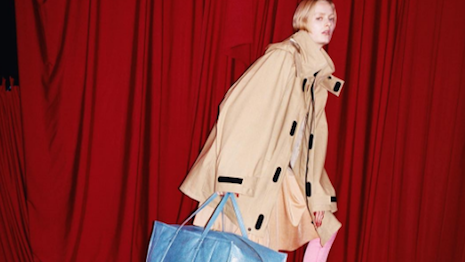Over the past few years, frugality has shifted from an economic necessity to a celebrated lifestyle choice, according to a new report from Havas.
Despite the recovery seen following the financial crisis, consumers around the world feel that economic growth will never return to its pre-recession rates, with most adjusting their expectations around money and possessions. As individuals criticize overt displays of wealth and avoid excessive spending, luxury brands will need to adapt their strategies to reach these more conservative consumers.
"Unless there’s a radical—and wholly unexpected—shift in global financial markets, it seems likely that we need to accept the fact that a majority of consumers in developed markets won’t resume the sort of mindless spending that marked the final decades of the last century," said Dan Goldstein, chief strategy officer at Havas New York.
"What’s important to note is that it isn’t just about the figures in a person’s bank account. It’s also a state of mind," he said. "Even people who are doing relatively well financially are fearful about the next blow to come. We just don’t know what’s going to happen, and we worry that our savings will be wiped out—whether by crashing stock markets, a personal or family healthcare crisis, political upheaval, or long-term unemployment. The sense that tomorrow will be better than today is increasingly rare."
Havas’ “Prosumer Report: Money, Money, Money: Attitudes Toward Credit, Consumption and Cryptocurrency” is based on a survey of close to 12,000 individuals aged 18 and older from 37 countries. Of this sample, 20 percent are considered “Prosumers,” or influential consumers who are ahead of the trends, an indication of where their peers will be in the near future.
Lingering habits
Courtesy of an increasingly connected, globalized world, geopolitical events in one nation send economic shockwaves to other markets, such as the stock market dive following United Kingdom’s Brexit. This also has an impact on consumer confidence.
Across the board, Prosumers show more economic pessimism than their mainstream peers, with a greater part of their population worried about another recession or running out of money. These individuals are also more concerned about a conflict between the wealthy and poor.
More than half of those surveyed said that the next generation will have less financial security than they do.
While wealth is not a direct cause of happiness, having a better quality of life courtesy of greater assets can positively impact mood. Seventy-seven percent of Prosumers believe that their life would be better if they had more money, but 53 percent do not agree that money provides meaning to life.
Only about a third say they admire conspicuously wealthy individuals, while eight in 10 show respect for the rich who live simply.

Image courtesy of Moët
Additionally, more than half of respondents said they would be happier if they consumed less. Havas attributes this desire for money and eschewing of consumption to consumers trading in goods for experiences, which also require funds.
However, while consumers are generally placing less importance on wealth, more than half of respondents in markets including China, India, the United Arab Emirates and Japan said that money would add more meaning to their lives.
Along with the desire for a simpler life, consumers are now more wary of debt thanks to the negative repercussions surrounding lending seen during the recession.
Consumers show an aversion to taking on a loan for most things except buying a house, the only purchase that more than half would consider borrowing to buy.
Of the categories studied, luxury goods saw the smallest portion of the public that would take on debt for a purchase, with only 4 percent of Prosumers willing to put items on credit.
Millennials showed the most avoidance of debt, with 50 percent of this generation admiring those who do not use credit cards.
"For luxury, this changed perception (and reduced access to discretionary spending) means that we need to communicate stronger value propositions, especially in the middle and lower tiers," Mr. Goldstein said. "The highest net-worth individuals will always be able to splurge. It’s the people in the upper middle class who need to feel that what used to be thought of as an indulgence is actually a smart choice.
"We need to double down on communicating investment value and also in playing up the experience more than the item itself," he said. "Because even as people are being more careful about what they’re purchasing, they’re also increasingly valuing new and interesting experiences.
"That can come from luxury travel, dining, and entertainment, of course, but it can also come from products. The experience of owning an item with rich cultural or historical ties. The experience of owning an item that contributes something positive to the world. The experience of owning a product that requires some level of connoisseurship to truly enjoy."

Image courtesy of Bicester Village; consumers are increasingly choosing experiences over things
Consumers also may need to buy less. The ahead of the pack Prosumers lead the way in the sharing economy, with 28 percent of these individuals consciously choosing to rent or borrow, compared to just 20 percent of the general population.
Individuals are also becoming accustomed to getting more for free, whether shipping on an ecommerce order or entertainment. However, they are willing to pay in non-monetary ways, with three-quarters of Prosumers willing to sit through an advertisement to unlock free content.
Consumer behavior and values shifted drastically with the 2008 recession, creating cause for concern for those who rely on consumer spending.
An executive from MasterCard Advisors speaking at the Financial Times Business of Luxury Summit last year explained that much like the “Depression babies” of decades ago, today’s consumers are more conscientious about what they buy. This requires a changed strategy to acquire new clients and convince them to shop (see story).
"Now that conspicuous consumption is pretty much the opposite of aspiration, it’s essential to create even more meaningful connections between luxury brands and buyers," Mr. Goldstein said. "There’s never going to be a time when people don’t want to feel special—that’s true no matter what the job market looks like—so brands need not only to offer superb customer care, but also to figure out ways to imbue ownership with a sense of belonging and a sense of discernment.
"Our earlier studies have shown that people feel less cultured than in the past," he said. "Find ways to educate and invite people into worlds that make them feel connected not just to new knowledge, but also to long-ago cultures and periods.
"Conversational currency and a sense of connectedness go an especially long way at a time when people are feeling uncultured and unmoored."
Deepening divide
While emerging markets such as India and Brazil, consumers still see a correlation between hard work and financial success, but less than half of residents of the United States and China feel that paychecks are given to industrious individuals.
This feeling of not being rewarded for their efforts is exacerbated by income inequality. The most affluent have seen their wealth rise at faster rates than their less well-off peers.

Image courtesy of Longchamp
Although the middle class in many emerging markets is seeing growth, a recent Oxfam report found that between 1988 and 2011, the incomes of the poorest 10 percent increased by only $65. In comparison, the incomes of the wealthy grew 1 percent, or $11,800 per person, driven largely by tax dodging, political influence and lowering wages.
Oxfam expects to see the world’s first trillionaire in 25 years from now (see story).
In Havas’ survey, 69 percent of Prosumers said they were for a redistribution of wealth to alleviate poverty.
While consumers are frustrated with having to work more just to support their families, over half would not quit their job if they became a billionaire overnight.
"Prosumers are worried about many things including their national and local economies, income gaps, poverty, but they’re also enthusiastic about a lot of the changes taking place," Mr. Goldstein said. "They love technology, and they are far more eager than others—en par with millennials—to welcome new digital tools and capabilities into their lives. They like gadgets; they love ease of use.
"They’re also more environmentally aware than others, so it’s important to them to know that the products they’re buying are sustainably sourced, have a positive impact down the supply chain and are actually doing something good for the world."
{"ct":"x7kalIN5JU1PbgrkHvoqZiJIdjtctv\/ppmw2XuMLJFt8OFmaQEK8ASRFUVo1ofal9MCPqrQ6U\/Zh8occk1eh\/WI3QMdmd1A4hAsNttwBiHjuUszQj3aQVqPbw20FQ3DOtzWklI0qs5Y58CJ3\/uYvgJ4Yoz9626p72pyKTKv1C+dMAJtEjwjZ7guKdcIGcL8Se3g3AFbO1KAT5VjgfhhmJvnOVN\/UzbtCbM\/gFFDA5p6Ch856gSE4JXN4xCeigqVQZ82kTt7HA7dwyWS6w4L9PvKil4mP5PYgJOAGt75nCKdRumyLz0Yje0\/WwTHFY6ttoGyqJbQhzYvrYZVzYU52jA0hfk35hYrhRhgbYetjnSi6pjCG8nLAtsIO0kig7yPsu3xi9Z0R5iMWNm10zTxAyAgWHAwCzVXUadfSJWBiD+SSfh6scEw6kog7O4MiRQopwoAyDKezl2RZXpOWYQhY6etTQqE\/ShONgYASIaoJW9Agc81o13hKLB0ea+q3cJ+rndU7wLZzm1BOytDMDKr7EPZJQXaiqO2cQ\/T4AeAKwj1\/wE\/gfENdFSmXyjZrsLrz1V6GZe5\/ZpXf1JPgGzHiI4eFNC5kTuouMqTwYfmyHEEoyul7y\/u5qFJhRKVdVcD+7+\/Z9barAA0Ow8YHpyckDdv2UPKay7O+976fXcGSY5nHBc+lx9HHlPDHgXmlTKDxyRh9S94jv+d3RAyS1RsmEwWClZ7wV0UGbzh7Gv1TFKDHzmei\/wvxTxrT6CBDdCJy17mXpVtDexZ3oq0hGUlYdEjWdpZfmX\/3I5FBKrklY\/VYIsdsY0sl6w558Wzp0XB18LddF105FRPQjJDd0r\/kXgqsLHbiOOGaTdc2htWgZgMfG162VOuZ9N7T3r9ZKwaUnJvtSqBSq3jPZFMLNo2tLiBjTBxuWeqeWyf1PhwZSa5J4ceUGOKbM6FS3OGOGbDGyzUdzzWCviRhlvcd9ISEd\/WYePiPgmzeljcRO9Jk4KBHAE+xQHsaYWUvlg5ocE5490PexvSohsgrUboXykzh60tLIQnnu5OyURm9kHE0fZRFRudxSF4tNnC6s6tTrLiMrpgCidcSiO+yniTvJdZmm39xwEPGH9vkM8YiRqY+ba5nbZz4Rj8MG9K5Oro2aBvXfYy8Am21ZpE7+Pt74qQalXx+6Wll+8VbNXbW3\/xKeENwlfowVdMPmf8H1T\/AUdiSidD+N1ilGjqXuK74+h\/eYGRR+MRkr4r3DUYmru1So9cYTn7ONpQ39U4I1xtNq4d7ebYjjqR3LoY6XU4rT8e3vYr33W9LO3POWjfDs1byx2hkzQ7fvXJcnm+qOZqLk\/ZKnbxySFnGZCNYuXUha8CUJH\/3fYpjhU1LVWfU7puZdIAK71f0eHbD0OEkMKujWFVrYFgBpAAIjrTTzYI1PjQpC1+ZVErzt2ImpxUyyMPEuWl33Q8JBMhH2YGMYVSldzPYO78PZ\/5+fCm2EZFJ5YaJcX5i2V258WiiFXWv5aBhVe4SfvKspSseTn7tIAozzvKNsuhy4BpN7Z+5kAqlUu2gf4tmVtL9R7xJH+IjLGFFtVW6ZJqQTbFC9ikGKm1rI9WA2\/LnUsXi9so8YTLA8KId7hldLgQFEK23geGuVhjI4uKUAa+NHTbAAaDBIbw6kdB9hQYhyNU2IRSCWuuU\/c3sojQZDpyyVWNCJ0d8ZP64MkYyFHO\/S\/uFR3xjKM5ToE1CIjuzj8aOXlRdhSDmZHbOdPCJbHcWNcpeh7HUHI\/hqEMXBkgv9nD1HjWVxOVrvTW8itacGOayo43m4Ji1Ae8lArzM1ZypbEhjgewLTgySTCN3fRUKZZ8R7fHstRdMmBOqsTuduG1cGQf8YqAC4a1wo24i\/8cOU27zyd8FD3h8SOTyRMPlpuqaKjscOeUnZAXT10asGSUjEmgPSHsZNaXaNH5ETDdNks48Vq5C8beyZKD97xDIjiQzlnwRSeG7Vgo\/wzvsg6jUtqH19cMbIP4DBloFLNnfIoyxFQHr355srhI3JXugCyazFtS01finv6qA+13BNsLvxJeCT0s5K8rH54Cck76Vpht8VVwnIoXVwREzbxOOp8\/+wIHlHUbrFCwiVXSZgTIaG+71Se7PKHJWrQFYB2q\/kBwLbi15UB0mpfyE\/whRpg8e3yCEaxbPaxsqt6tWl9QtONmw20dM5huZzyCj4QBA8IehIMoexUoiu0owVU2tB8eZrwar5S\/qfIGy4WHdSwZWa0hHKsUt7+oCtNBDpq7wiYLb5aOtQPpc0DRc+LkzHcxn64HaqQzEkj4cJPmxQ\/hoE8WtOg1P9Cwd931yJLrNHWKK5eFuu80GOa8azlmcEdh9O4T0+odH9vPK7UOkz8oSR2QaCkAjdbA2EMDEYaNW1pzFkWcpP9aE5+6trFr4sAmr9RzNjXywLvMo0AGY3sr6vX2ZLdAwWhl22HHqFCXyUX2289dJ+i\/YRdToCybRQlEJIeDzw2sXO126vwDHbVTZlxjHL6pVLaKzcROviCJjHyXC0hB365XL2bbjnneZJ8fdp75OxMOdf0fxHc0Opswl0niL8+uLqWCLdsH3NYBorJc\/utQ3ui8ylLO0NfTs8nuIsm3RFbXNzRAL4xS1\/fi70hsTVWFJWU178EzCToGH6d10h2LuW52exrDRR76E9KOLfTSbPtmGUl56P1VhIQALiZ3KIJqL5R\/xQ28ZSOtFK33jFXPa5ilA2dEcvjr8KGgZJAkC+Lof0FiRlgICdkvfwQLfejdPUp9755k4m17BL1A3UcG786EYzPkB74uoK08u3Xmd15IWHqH6R2aBpaaou2U17vNuyfAp2hLMmb1Nwhf3viVD8h2RSMjI0Ux1fq7NjXKwDAdeiWfSkgFLK77oWWBG2jHyUnRsuGffI07KTvcyT7JD6MYHn3FnhlmiW3brDmpgyuOmgsdKIOuUacadi1Qi2GNfvzadcS+j24B6UL4WMS10CUO6GrSBQhNAcOeFMw4dv4gTk0jEkxRA7GtZWM7gkyi\/wPv\/+FB54XRnEP2VmndUwo+UUMmn+1U0AxxucJ0HHFafYA0lMRC4lStYGo+K652DujkMaJNaur1TxyleBGYL0WZBUTh9sitbC0z92ax5Lj91nCFPEORUH62fJx\/DEAmJoVQhSj7FAkRbSTa9397umNw5A6PPwPQ453vUHZiLI0GkMK5CcpsOrtbF6DUBjb8p1mSrTJ34bYpUSk0oW\/cXLywchQ46ckXUvGyYYWu8uDyRVqMD64BqX7CXnJwU2KaJB1tzokJDiTFiSVhkaLQqr0b0jlTxiL3SM\/Mc7Cd\/lysqcf+7oWe\/ArJ+FuB2vufYk2PUMl4P5JxIWwAzscPRcVd0QPjeRB6ZX3xc8aGhQz4FxdzTEMkMAfz+qLPLCUUVDqDAZXn6stxvauAPoJakeMNoPZT0HSXRd75m1SpuJUem4ADd8FJL3kwlrv7\/WdjDf1cn9zOt9FpiBm4qpDysRVqnfRrQWqpF6EfE063c5fgC\/tO0a6TbFV7S\/yoLYqL8YdHHrTOG\/RY1v0hd\/8KiOBU2SjIJQ76ts7WZm\/CMvYwqW7lcLpGy7\/mUjC07gEtYFQBcPQ2aKNDcQRk+Ojm1WfpDqiUqtLspaCrbpcWxqVQF5rnXerbenBO66iU\/ndWaaAQl2RWUz2nuAakmOsrh25+ujkrwQQ9iUO5GYONjlyHbo5I4S7G+DXnmcjAaJ1KfhM28UxODUjtjpyRJTL2cy\/6r1bZuKLgO0NjVLZvp27uRbNSJ1d3KJCdvbF685rdobhsCbr8+jZqOM5GOhMGB6oWVegx073t6SeNvALj1P\/gi7kweEppJWiFxcYXQeY3PGA\/VTbJ+AsKnb+3ipzg8qVtlU+IdIEGM2ZOBfOpo7YUvxSBWhWSIjnpGsNlcGKc7vFbj6qKCdy6X6Z4SzEgbzCV1XENc2ksGdEvo1GIkLMSEpTPj8s00FuZpbLbjz3xFsEh\/eM4ZbNLZpkdjkDM0XOqFdEJrNc5mIVkLHEmRTICVfxD49e9HLf28zfVg7UcSJl97XnZb4SiMK5tpqkNSDXD1O0UqbtwSC5TuGSu7mocWj\/RpSbZO4pZXHe+BbI7T3DqY4o31xyoBtZS5xWsv+nda\/49DlDs4C2AicIt\/LpH3TrTZSaJEzFq8UjfSUftzBFk8vCvopYlHgwd0B79yx3y\/Upk00zWQXwmb\/W0Ww5zYM9CpNAQzmK92QhEs3YAsvn7dLK+12iCUIZX60mpGwJgHlnyESlRRhkhmq6dtz+mFBFQhjCaGrvEMR89hqFpNHpHyKThm8p8JDPXd5NTM1OunUAMJoMafI6+jDsDl43IzFAqQQF4Ycb3B5D4IQnSvhnfqfkjjKyeQkiMHXAIq3MpZPh+M6Pwcnxvpu8h\/llHovxPxr\/gIRuR7Pb0fYzHzp0Kup2sztyyaeZKnqVYse4xn1gWWso\/PXTmQwnMrnnzrWbQUjGXvQ7mSgIQ6adDHOYIIgBzpvZCO3npS5c3uEoaWJad7wjaW966HlgMtQoGiy4N27Xod35wOTo0J8TjnLBcYTEiA7wFr6PAhkEDvLD+yi6oLO\/Y1BevnOzUrLJpmgbz7+XITkB3QJIXkzgkEAh1ZtWJGcxXBdu8+XJGvqZTPZxOJemUTqzccBev8RnfJWhAZlD6OH+Y1PXR74s6BxdXH48QsL50m3Aiv5lgSasT2wrVzXx5Dwh6OpNnQ7Cgc6uK0ouA1ZBoBwHJRTVlX9jXRY39WgrX4\/cWwHSij7Tl+N14pQMxk\/AHTpUQ4DtwLZEyph12ZqUuZDlxmm5OykEYYBJsEN9fMe4EUPPguBDu0dY+\/s7oukFNVOdMn62m01K3iy4000eehBdkCUxRCNtqxJw5iGkOVcVrZ3vGDaNHF0s9x\/uf651m+qk+fEIWN4aYjFIzchWl07m1lefZfndqBBL\/YcR5T+LPFiIzqT3IDejGKD0tXfVolvl7AnKHfEgtySuAssVDin\/M4psa1dHz\/9VTAcyNj9I6nKD0d\/Z\/gLiRQzwVwJuXrrQFNgQ7Asef63TTNn9xWdUqVusx3em23s34maGkVLuw8hhaIZjfWIWj+wgz2mocK3z\/1kM1YA+3REpLcM2EL0Jm5mMwERiqg9GeJ+WFcUSGT7zVAGQPSHiV2+ROZsmOIpJ5O4igsDfzLuoH4GGkbFyoYpRruy5u75EJb1bvx6foeaTtlkeEzDiPg8+2618iFLBSI50cqCaDNGcQmn0sZ4dBFHJKklA6lkomUIRzNC13ExdkdZDRZqcsUofJvCeV7hoysTo8D1Jt7Z2NQWGSI+RgbQoszLx336\/E2Gc7hyHhKJFTlxO0QmmeMjJpmpZRGDzTHK2yUIBALzYryv8N9swyuM2MYLzkpQqkIsRBFTONtIqDKudKg05qktaIPSnHPU4+t0S8+O8U0348x\/2PLjEtKtQD3C0Xu8B9LaZN4ps5dBNFF5FSFBrDk3wfJT8tWHtptdLJBeRJUgLFOkRbotKx5tUdv6Q0DGNd46crytKMd5De5Zci83FRDKo4b1QuzovjpTwuYNMHPFSMMYIhbc7HjIpvJQffHFhW09tmhc2i5PLhEKRpz3f7z7swsvQ3nmS4LTvQEXsXLTQ\/EMR+gZfTOUKK4nGYttSLJFES3Lln9RXwz41O7VDooDiC0Lz7ni5vJs3LlZwANRqQiI7kRguGatoGpqr0WUstILLrBk8UnvuSi2ADVTPhqVU5yilR6DFTRJCII4Ykz\/2Gf7g+xEfKH+JvVbHUKQQi4q\/XJhlx\/yiYDiQg+TX7QACgDVGMH0ZuoohaprpxGNsdRYNAn\/ykmmYAC0hcO9iky1jnXBa0r74x+wNxK\/YOPbLTlhpBHPSHAbFpiSZMUyjqO3VnG1npNPTAEsWirlA91OlLdnT1oQEeJkbBlcMjInM75+IBWAFW4MbJdm+0X2RV5XNALSPPeRd15WcFPvCw4mqU5n7tww4fgfWkFlmyg4oSZix5G6PthjmkxvLLSn9SvXpv\/V0lfJiAUdxBHATm7Mw\/B\/Bitj8Y7s23kKfyIm5QuG7iY0Ilznp3fMn8RZSCSmioeYedgvzD8BGVwbNaELXV0rENGTX3zn5LyDrhsowLQPdJXXvyhglVZbr3KQzTI4LP4UHEve4oQ4lFujWCgPWD19CV8ACdnTuv2ZrnnusmQPNZcMLT2HCUJCQ+1GgEPuG2S8YLvECpSpwMHWC6YT+aHqkj05eZdQh\/c4SDnZqZSwqwCqLxSn1qmoOCii5ltZEOan8PCSCCn7TaH6jpfAwc7TCB7DSixncjc83L6tA9nPPqPSmXMBIJmeSHRXhywko5\/Pn2AjfK2sXZ93CBUgGc\/DWE+YoQadrLoLauUubfRUCGPIhRPW0ErUbINnu441R1fNz\/9bVqz\/s6tF8fWDMqK7ePupz+ntvd7mVBYQaYcqFyRfZ44VqoVn9CiFnO7KWp\/Ez\/9mxEKP9puSksbirzlde0K0pZcFWqf+vScdzNTFY1m8qyL1MOTgIsZxKjGArKDsq0ZgVQwVoYDRxJ0TlfyjmMI3wYxh6eJfflCza67TZSgWo4rCsiuiBa\/5qvVhZ3dq2O+wGKE2cKXMAA\/twM1WZtQP52ryPa6dabtTUtawY1ycMpvFqONTwXbxHApSNXDC+4YnkxUdH47WgBNG+08YChUsL5SGVY51l908aKnh4iw9D6f+IP8PNLlTwoIhCvxUSVvg0TeJSOMmDsjkoV3vR4DrUjRE7iaJwkO0qxtCyUWdKU6owrw\/aKFtGvu3V4zvKnNSkOkr6mZNFJvEgpGFcX0aSINCXKpFHeWdgZkgNZErpV17XfpFI7F5RXiqWHETndNwEWLo96qE\/S+FB8CTwXWRR4ma\/uIY9nhIAEBmjH3g+vvl0APIGFiDEfK7CozefqaqR6HW3UNOl1oWiOuTy+1pC3QQysimmAyooC47hBw5rDOikjhjdo34YT0GfEp\/aKls3fAN2PMhihR3+BikJT11n4d\/4TeGaNn\/PJOw6JwH5VO84gBLQNt3PjxVZ6jAzXdynzXKW6cDlYNBCjkezNjalypNpRjuZM4icxXbPxPewbL6Gj1A5QahZyI0Qvo+D1G4X8wyoIOdrGsCH6apNNdiEjzQrTPO21PX8BfUOkvAxaVqGEb8gFTRzs1xn7K4J4eiyJpqD4X9KuQeXt9i4j0xvjkK91ZBhjLDKiERkfYLmHIHJZJBeEXzYCo5Z1iEQ7UUIE1jvpYKK78uzBp0ThxRY9cu9l7YHYuiiQbSKsOJE6AFTlomhbC+aM7844EcOruXTGwHAfJd+Te1yATf1IVeKdk6hwYMumF3KJcTs\/9sd2tu5y4E1rtKlEvvr0kGb8ykThnpifiRmyANK9G5eesbWg3Cz415WdbkP3SoRrzAujG\/SP9dDngqmYteuhNNeIlFK6aCVF8p640sEGKh8SBfAeT8zN6aqpEBfuJFK6DPsCIN6ar1xiB0LjEWjQhYphJ0g4+x1hL2HywyJiGztIzhqsWb76MBAQ2Vi32JU3rra0LOyWMdvfsjzDLvN0Zx3\/PduGL1B3g6WgVwAquIf5E0vlNVKxM4572hiVIqv4ElNS6g\/OfrVl3ENGg23JUMFVqvhP3gPWyirEt8+AHZmalY6n4jGZ88Jxnd0loa8ck6CSG\/h4Wc9MFHc52CTUcNoQ9rxwu3csWWDWYmDT4AaQpyr75DYTh3+Dx7yFNT9t4DaeRP+7WSCx7eS3pyt5ntJOhyzs\/m7Vb+TMYTNKjXvXgAh0\/2CIpXxyV75S\/6voXPjw79FaMZDFdrHZY3KdZffX5CtdBHPWFOmw9h0DKW7Xhg9EXCflU\/e5Z21h1U+mKzSbRXiCu0\/IxjgM\/Q5lThM1O2MYKX1lhBN4QFzScSmr\/LR6WSNl7WaCz0ewG6NshHuBFNdOGogh4xQOGX0nBctLPPFh5t6hljKROPv4xQDQnGLmICeRj1EUNLFNn0ZqcliJxwhtIyV+kJKATU8TBCKGdMm4CbYiuuNznfB21RqL3N73CQiEIQlIo2FNp2OZ4J7S821iJ18IseYY3m0Vgvt+FvWREqX2blHoeRWCCnBaKB6mWS3yEeYjeEGUAPmuoifE\/z48pqOOULr6SXK15tnY5CZEzVk\/I89ZyUS\/M3WQDtuVc7\/RhA\/5HEFSxrPJ5zso0hoTbeK5z6je5w1EJmsaRHOqQukX4kR4MaUZzUelS2dDXBtjvd0NCkPBHQl0kZowYev4\/czistygYwYdS7z71PB35cY0MqnSdGqleHVRH0X8yhPi44K5Gu+sVz3051QWFG7SsFwS6Uql0FwzakAdaB6o94wPOiM9TdICp2YUuTcpbVr0xjN3\/CPkUTd8pJqb95WEb4ppPPtD6e9gL3NGcJT2o8vZcd0NGPAhAzCuXfFmshem74c8aWU+hoEzizxoOety6eD0RSYrvtnCi+FmDYDVHB4ocMcGGAX2NpderxM8FuJ7Rwu8u3Hvz44kDl4xm+B8D9wOcJK+\/1mGDJbfQfDokB5SX0lCTM3anXpFexpuHRB0HRL4IVudDXGZa8wBgV+ffC8b\/im\/iznf84UC7rN8RL8Wef1ulcIVyF1ZVPL0PmtpjVhHXpSu2CU+2o6fVNPtu6zkbfE9O3NJD0zVWcY3zbHedW3QljPkLZX0SwUgqfE\/I4MwETxv4VuDhJR9Ke1byARVPPUMnZDooY6y9UcG42u3vIpI2+uDqwHRq8qFek4Y5kXMjR333eu4wNGL4iGIcWKenhazOh4ZYJ2IChmlZU54G5s\/0FDhxk6tUd2X961pO1f3XsAUzRWVODVdlGB3HQQnwMz6hGiJGRN3A\/KNunUxbtKHIitP88rBKe21i\/pkfNvkmsh+0j36myZ721iCsisqhz0d1NiaSkIcHCkdv3\/Bs4wG3DnKbiAhMyj33VUT0e0\/NjHkc383ZI4rUN6WNUxk58ccIqhXFDSHjCI8noS1q\/f1h1hRhqPvR\/swUKpCf4inFSzP5eA5LjDF86BnGGICphPaPTeAL2grtiFr9NqO\/qeY\/laxUPnLTlSfQK63zgJjrUkXvM9jOrBsR0T7QaCARFTLf7CHfx92kC3C8uop8sEJno4QGTFGW2f41j93WgHYRnUV6qZ3z1G\/qyvPJIQ\/9SSrrrRFbGVeev\/pmK11Gs\/ylzlLFSpqH0LkBHVXlOLGMeKjLB5tMJ8LnQImtbQ23SbxS5nbRfT6WQLTAA6\/ZdhG7KgOa52Uv+qedBbZhNKHXj9k1UavsYV+MUEY+Bz\/DBeBYyPJ8bu9e42AVwYFvpNlujPE05QHDms6HNw6KBI3GvvwdxIr\/DNa0XyMMbCul+nWBQvmUrTGrRkCBSIOIc1xPpAS5q\/wcWpQTf6mJU5+8Nigf\/AQyGF\/6GbDK0fmv\/3gLzHH\/KMWZIwDT3ZXonu5GRS\/MFyWP1Re79Bk8ysVqRk9PrSlOYUitXOAwVH8omo54Q3rqNsg\/YnIj7XAaAnWI0\/LsQiQvoYbl+oc19egwRFW9+jgLIEW6RVK41EJPwhs5LmBoSh\/n6af+0N5neT7QNzF2NIf7cdnsgqzQLt\/XibdOXI2nciXWYnK0DxjSx1uCufy1kkAf9rAWECGfqADoXjjlZMgoevpnJ\/49Gpq+LbnF07LsThcFdfkoBslxyjtqJbQaOPkwXqCd19OLMJf3YB9RtWFZ+8e+U9x2CzpUiFrThd9zM\/6SFK5rlQCIz7EYFArX8yXlK1U+7mI1GFZCfZitclqYG3NBJbyUiEnW5hFWQ74w+iKRzmBE8IntqDl7YjoI8xBMojSPyAzmCBK937ITNBcOduNC\/l5zkteZgNL2OEm4D1NEJ3m6cLacCU2MY0mIFggzGwnEvkERyA4riNO+Oo35v\/kSpAfZovsHRgmP87109d0xRFyL2r9Cy92DedNWvbORvqhIbZE9ltLclfC\/cYDEgVYBAWG0XWDsgsiy6c\/60eYqrC9G8a5+9QVCrDvc4MnnZ9X6iXm36fqb3UzrZyScuAjAEjySe9WT0snHDcCdBBINeUIp6btVo5LP79WBOiJAdGNvR7uDXlvLLhLNnLiCXNXH1wyaLeqL6UHaoHWkzB9Rx+ViBG6sGbIsfiKhsQ0pqdBq+LAqQrP7EPjjNTtPsWX3O\/d7eRIvdShs6SwiCClRHZObX\/zbFCYetLiqxZHlbmYyHQpK6LJTD1vZXqBJBXNaUo29xqGR0ta1zy7jOD8nAF4c3MdBQxOLyAFmLCjMGM5eIdwGAQriTjhnPjYcNMkCXaGRy0hsxQDTF6PAFanaKs2vh\/D+H3KUNC34CpsagCEKfb5wVSe0iiLtKaHnIaPOVhkzhBLO49PrbTmLmZtzdyXVksJm7zsoyQoj+eOmlcCl5qZdluPjnLTBpdfHZxslOQXe\/aWzVTRrlFQ5XmeHz3WeUAQfsmeyygnqs7Q6dl4jnAzcJajzFgJXGKacIoMrk3aLCgwhP1nNeAGQPQT3k96j4wjr4oC5vea5nG6AyngDxJJBoWiIKB7ePzgXWipvfQphMN7HlTqd25m+G+NArPt8obVaYumzD0F+i5y2WtXp+w2C45MoUMSZPXJszd8L\/AyDgKKDp645wmLqm3sn0lyIc0e1vFPokda8VZuBiuc2g+vnBt0MQjee4b62DqNwqe+PGCDWVcqaQpMWcSp4tyBDTfhXoWsYgztCrNKpwvGBeXgdWr7hhoJXfj\/sUwRktloqKH4a\/RZ98lYNT69eYJz2Yme3gEz3KKVuZzj4BHKKemBGPNsPz90eP\/bt76Ke4l\/+KLclnqOf\/O5RvNSAEjoADltIw4K+CzR3Kt+4yPJlPLvPYCgChO1rCg7u\/vHorruGCZ5X3JmrwXXlSw3g8wyn\/SPq7jx6W+UdllyZGRdcSCZvYDgjICkwkl\/Du60vVGQRRLPMBTwBXGv\/mpwpVegY\/5EwSyAfLBpCDwFcW4EKtO7bk6aHQ5\/MCtEnEzrhA4LNsWFw9ZPYB5OAn1vAf2\/gcrhuCs9EFjoyk0we+eRq96OCv+jy6s9vXzUwf1fTZFvbsvN7IeFoIv6jCBh7Sg2eQRvNYpRzy7YsDDvkpkG+nXsa+m\/tmnJIIZLK82F7FS08sHLVjteFhp\/YyOwyWLV1\/AD7yeUJfUn1Uztha6NtShKqjUH6g94dlRfvBE7s6kOXEfDOKZP0hZP0r5q8JbiSeI7GjegcOx1xZFF5702HUwFqqOBg\/8+4xk\/hUGZxRoAUczJcodyqMZ7UBlxwX2Qu\/9105OeGztYluDrGIfzDPMyNGxfwVR5U4mSImc9MP9t7f8lf04QUmerkPN9EDc7mr2i0yS0lhL1Z+ZbAJ9z3he03fT2l21hML5vPyPhjMCntirOm\/AtNe5O0nylLHwFtJBTgNdNykZRbU2DOSfzcQtiDmvkxA0z51RmmE+MGG30NgHpzAZwDVAcKzUnjMpHpxuWnjP0lDchtvZKiAuIYBqvTLWL\/oYnP\/a\/w9EvR+4VUIkvLKkZkPUDsJE9WMaK0zi6KTISfZd6zMh+\/vN+n2lDBDsglbw5Klb\/SbsbIW6CBD9RFvVFiU432rpe+TYTb2W8X8Me66mL9CyxBdUE4glqpUI0B4FEuxjrDMc1WEmm1WTgL4YV05FibIJsXZsdlZLSRtbJQRWxRj415tzFum1t2OOYcEGKv7cd4NCzOzGFdT0KSuGACwzPXYXjEAnQ4\/KGwQAayJWUcGy0zQTcDxUtv98bbJeS0g1HSIXBsCXTQQm1yhnTbC9sgSH0jzCLyYCk2w+IgkACaE+w41U+msSneNGcgQtrCcuFhE9O1oAzMza0tXB6IpedlIbAXbdNazKgqjERfQ0+6X2YrdPy1765D65sNIxiFLv0zH9HVeJCJo92KlTlUa3YUv6gKm5O0GLnYCEKA2uyPkZG8yPQzZvGoizKbl2XYsL36HJ5GjWtgm5XkvE3dtYiC2EiYb6hFG91t1W0t4KAtoD5NjSLAU20wA1mvea0k0FCDTnUxtMkD2\/S+SwX0ushmIcp7Le1iaqVkPbSIS0jHIm4fQvM\/krEbM6XzI2+r54XY3vSN+1ZE0zinrxQMzg4t7WoJzATy4frijpwsb6oFECKaMiGyDK5zcdw9ldqFyuklWtt7BCkxSQnvcAM2wIAcpIHG956FI4ltcOAniIgxBTetRmGLeJVk5M6og4zJjM4y9TWTaSko2mS5Xn8lZHnpdlXnUvkS88H9rykjIUp51shAF6CdCWoU4VFfGdj3x3syJzsZtU6tFqvk\/kwtd9Sl2PH1M\/DR8u411zzkl89qa1Cy7fB6NIn4GrA5ZoZN8VaO+XpAuB8TPra\/dLv0n1Vi8v8k5At841c1zRThWFJn6SIvNksoamcwb3rh3YmBaRbZkA9x79kU+JyPLZLkaLoZa1aSHTOJzX3IO2nxiPN1fFHovQPQ\/puRA5ls34S7t4ahJb8HilRrdQ+\/M04qwhr+oljOCUwuO42c7pxwcwTVE+ph9EgM+8A8pb8fdn4IxZv4GGF1TGxvkkAOraXWyseK3NPcqidGIQH9kp+KKunmPt59QTMopa74sIfjh4g\/RXlS21QCI99C\/PfrlyotPCk6ZdY+ZWh6RsWcgVR7cN6wT2BwGgPnWKC2aDEo+A3l1V4SHuGUFfQZvVGqxn7nHl8KHKjuYriOY+4vGE4FzER7EBc0Xx2w2RePUK3vGRpkYkgZ2NthRAQ9afSsnru6\/v0QZZ7TcT4hOe70ZuD5ltWdOQ76GOxJ2zUkWm4vz0GAPWwecIMVhaOzN1bGb2Mave+EpFMBKwxdNogtIc\/KKmlN6Nxmb8Ak7SlmfxICe5qnz\/\/MJ5FlAFgvfvqf3qd53GWdjMHm7o5skU5HO+0lyRYSVpG2VpIEQkkfm8GMVk1i5znH5C2EcedncXamsX1Ie+jxEBtfJ8fazhQLe+SdahGEHV1jAyY1f\/2WQIjPY7vSyRmItpMikZBFeMzg9l5E3nZbzfit6j5i1HmJNLVDSPnfFYvams46FtPPNydt7uEuilEJuw1oPw4JC\/sDckWfnIKtoOl3w08lZwgvx1aoEHG9crxHfKpM5EPQMGKAJ\/8q2cuGWTOafr00Mb6hkJ9agnMheEn7f7yTeU8r0plW7A5fdTTjMAn5Y9bRdTvEhgCcLqLU+PustI5TIhi7IWBoha+GGNtkW+AmvV3OY2ks+DgW2yc8xyVH\/66EjwGtLXm+wJxkIUu74JMrZ20I2rHqITmkIL9vBfBDRat6QNKllq\/CGc4dSf44ijuShbVerC0rKpLP2Fptcf2aLCKLOBMM+ExXOQb4X646\/ocXQOv60oW+q8W6Q0upj+taCMulIZdsdo3cBmIxzKi7Ehpvr4nxJIPMF7sli0be8wWLabzvA5RY1XFY8xSFgRpsLlF5fbLZEcALbHOKxmpqMDy487jkGhNGpIOjyUILAzs9AKL2G81wCLMNq6ThEdrCKs\/i7BrbSHidWY\/ZrmLmoP7oTUFPkgF9HZk+y6E5NVViG5kbHoYApmUJPMTRAz2IOuAL8E2xZKWdLVtEH6LvYOZRefMuT5WZFYUva3XeW7dNEIHgflYBx+RUE9mbKjtFZeIfDEofuFDWSxLsByQ0Pp0CuhebXy\/R2Gsh2DcnPtVQcEkOra+AeFrCXr48gvc63\/44PgQprEJNIgLoGpwQgq1RjFbcdUmcLmI5qKr9nMy5ffjNxpt1P7GmwCGuHIXi1I+aug+2fQqb1HanJ5jXcaEX0CVKmXRJ5jormJR88hilIwhWtP\/gIEXB16sMaUZ8fREfuc5hqpf173hH+yKQ8eqpfAMyjlU0N7zOicvP5\/6AppJFNHSo52Zke7OBSyRDgRdFuSsKuqhjldDvzclbLQYauR4eX3HDLPxY4GA+chRhJC9KhvUDFzMpnUzXctdiODbypDGIJOx8J0n72+9ZHaGRH8VtyHYXF9yh4nb\/jRAn6k7ic40mWFXH7NK\/ANgtEcmlT6GsFR4HBhj80VZywxiI0mS1K+RbBlyRkVH6WaJXLZR0Wd0h8ht1b0qBvbNBpEVHieutyC+OYe+R5g41RyCHWXAApVRmuS1WAZQ\/Io69Ksxp5\/pYZt0WzZVZE+HdGxkP1Hc4O8EZmiRsIv9QxSAfOzYObsml\/QMwvz4PX+w9ltoUKXh\/0HTA+jWvnaJ+dWyGZhHXPTWrM1DWXTNYC3bgd2bM7+J2dFdYg8wzauoa\/dhTiCr3\/bAk8kDQTz7og0Y+VIlTyo4XKyYgv4cupVs2DoRCwxmBl2YfsvdPuycnwheP0zKcvE2CvDrhHzkKmDVz1VyZsplXnVaDcsXjrOpANhEN\/IOLSrPdggP9v0QIrgQb+79Nr2KaRAQ6tTYjSIKn6E9bLUzP72EQ0AxFu\/Qy\/cvxoNFNpNRfF0fLmg3lIu\/RnWRMIeMJB6q0K7IdYoh2VNc9HH9htOT8mZchcvB5jWU55tAWhRwzlJvMWuj4WKigtL4CkjV8vtbWS3MGodvJ9W4pnAbbyuOELVLKZJu6pprONsYXFQy0wr\/UOOqxKW1xDf\/coNL\/KCFvyzHYNHo4aI44u4fO84brctQfEsihHC9d76XYYSYWy+I\/qxpJWnIXhxtK\/LuUkqkcbePq0cZR+rkt1ybnzS\/pnLtJ\/k\/reVlJgkuSX6HUv2r94732wdwWegZNh2HaLbcxDmw3EdswnIfeUSYRRNH9njMjedky\/0z2JbMJ\/fHnfbX0EYzPIdwDREFIul4DBWgd56ocGQ==","iv":"f217cc279e3247fdff164428b9f82056","s":"b2449c94436de68d"}

 Image from Balenciaga's spring/summer 2017 campaign; consumers are still carrying over habits and attitudes from the recession
Image from Balenciaga's spring/summer 2017 campaign; consumers are still carrying over habits and attitudes from the recession